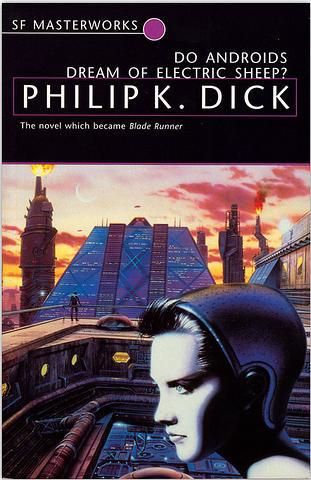Welcome to The Library. An area of the asylum devoted to reading. Our first story is the famous novel by Philip K. Dick.
Easily one of the most well known science fiction stories of all time, 'Do Androids Dream of Electric Sheep?' is the novel the 1982 film Blade Runner was based on.
Yet the novel and the book have very little in common. While both film and novel focus heavily on a character called Rick Deckard, they are vastly different characters. The most notable difference being that in the novel, Deckard is married. The novel also has a strong focus on the philosophical differences between androids and humans, primarily the ability to experience empathy.
At times it is difficult to tell if Dick is spoon-feeding us the empathy element too much. Creating the Voigt-Kampff test with questions nearly entirely based on reactions to animal based malice. Of course I am not up for torturing animals, but I feel like I would easily fail such a test, as just simply being told "an animal out there might be getting hurt" does not make me feel empathetic.
So perhaps the true message behind the story, is that empathy is broken. Something humans tell themselves they have, even though they don't really seem to use it. This is what the androids seem to believe, for the most part.
Another difference between the film, Blade Runner, and the novel would be the portrayal of the androids themselves. They are made into much more sympathetic creatures than in the novel. In the novel there is always a level of false emotion, the intellectual response versus the instinctual or emotional. Where as in the film, they are clearly emotional creatures, whether insidious in motive or not. One great example would be the android Pris, who in the film is played my Daryl Hannah. In the novel when she is first introduced, she meets the "special" J.R. Isidore. Upon opening her door, she quickly covers her naked chest. Yet this appears to be a false response, as after a while she forgets to leave herself covered. Another example of the distinct lack of emotion, again focusing on Pris, is a scene in which the androids systematically cut the legs off of a spider just to see if it will walk.
Strangely in that sequence, I do feel the empathic response, maybe I would fail after all? The character of Rachel is also in both novel and film, and there is a romantic element in both. Unlike the film however, the character of Rachel is representative of Deckard's doubts. His burgeoning feelings of empathy for the androids. It is after sleeping with Rachel however, that he discovers that his feelings of empathy for them are totally misplaced. That she has slept with many bounty hunters to make it impossible for them to continue their profession. She, like the rest of the androids, are not likeable characters in the novel.
There is an overall sense of dread, entropy and depression to the novel. It toys with spiritualism, religion, faith and questions what it truly is to be alive. The novel is an excellent read, and I do highly recommend it, but I do not suggest reading it if you read to cheer yourself up. The novel is incredibly depressing and bleak. An excellent read for anyone who likes science fiction, just be prepared to feel like crap afterwards.

No comments:
Post a Comment